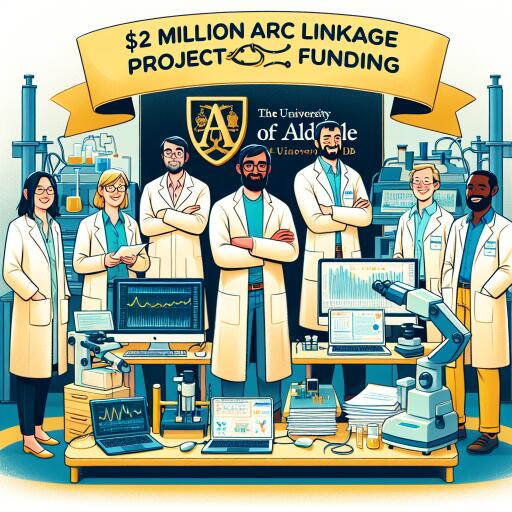
Revolutionizing Research: University of Adelaide’s Leap Towards Innovation with $2 Million Boost
The University of Adelaide’s recent achievement in securing close to two million dollars through the Australian Research Council Linkage Projects scheme marks a significant milestone in fostering groundbreaking research partnerships. This funding is a part of a concerted effort to promote the exchange of expertise, knowledge, and innovative ideas between the academic community and industry partners, setting new benchmarks in collaborative science and technology advancements.
The Linkage Projects scheme is renowned for its role in encouraging collaboration between universities and organizations, aiming to translate research into practical solutions with real-world impacts. Among the diverse array of projects that have received this funding, the University of Adelaide stands out for its focus on sectors ranging from agriculture and environmental conservation to material science and data analytics.
Innovations in Agriculture and Environmental Conservation
One of the highlighted projects includes pioneering work towards developing a rapid-drying barley variety, spearheaded by Professor Matthew Tucker and his team. This initiative, in collaboration with Coopers Brewery and Australian Grain Technologies, aims to revolutionize the traditional malting process by reducing its energy consumption. By identifying barley’s natural genetic variations that facilitate quicker drying, this research could significantly mitigate the environmental impact of malting and present a sustainable alternative in the face of escalating energy costs.
Another significant project involves a collaborative effort led by Associate Professor Damien Fordham and his colleagues, focusing on utilizing DNA technologies to combat the extinction of threatened species. This innovative approach entails extracting ancient DNA from sediment and bulk bone deposits, which, combined with ecological modeling, will reconstruct historical distribution patterns of mammals and plants across Australian landscapes. The goal is to inform and enhance efforts in ecological restoration, supported by an impressive consortium including Bush Heritage Australia, World Wildlife Fund for Nature Australia, and the Australian Museum, among others.
Advancing Construction and Precision Agriculture
In the realm of material science and construction, a notable initiative led by Professor Scott Smith seeks to disrupt traditional building practices through the development of fiber-reinforced polymer-based structural panels, integrating recycled plastic composite. This project not only aims at pioneering sustainable construction materials but also at transforming the construction industry towards more environmentally friendly practices. With backing from Sustainable Infrastructure Systems, this research promises to pave the way for future developments in sustainable infrastructure.
Lastly, the field of precision agriculture is set to benefit from the work of Dr. Wei Zhang and his team, who are developing sophisticated models and algorithms to optimize the automated greenhouse cultivation of mushrooms. In partnership with companies such as Clever Mushrooms and Pixelforce Systems, this undertaking will delve into the complexities of the agricultural environment, leveraging data analytics to revolutionize how we understand and enhance mushroom cultivation. This project is poised to deliver actionable insights that could significantly improve efficiency and sustainability within the agriculture sector.
Conclusion
The University of Adelaide’s successful bid for the Australian Research Council Linkage Projects funding is a testament to the institution’s commitment to innovation and its leading role in addressing some of today’s most pressing challenges. By bridging the gap between academia and industry, these projects are set to make substantial contributions across various fields, from improving agricultural practices and preserving biodiversity to innovating in construction materials and data analysis. As these projects progress, they are expected to not only advance scientific knowledge and technological development but also to foster a more sustainable and environmentally conscious society.





Leave a Reply